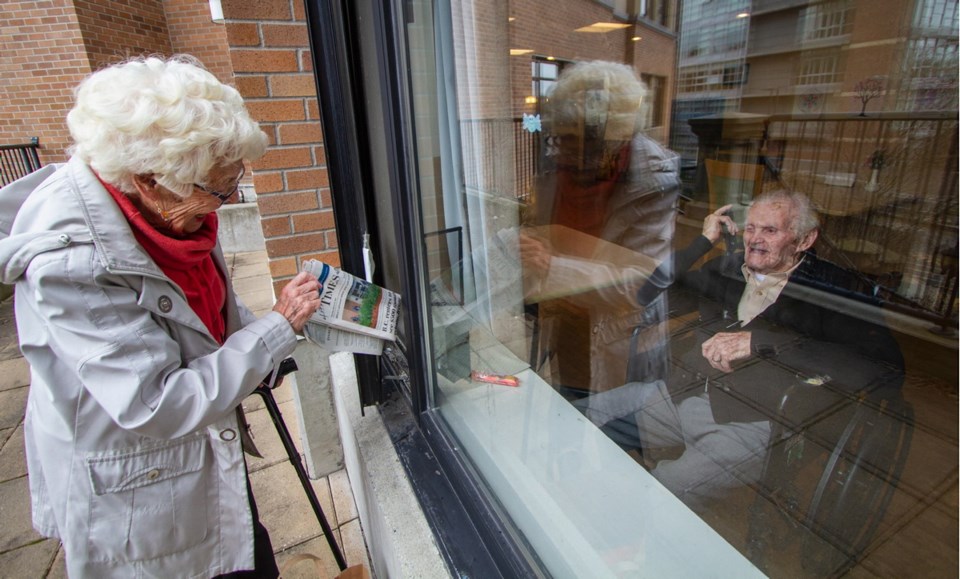Hilda Duddridge made a promise to her husband of nearly 75 years and she won’t let the COVID-19 pandemic get in the way.
“I said I’d look after him until the day he died,” said Hilda, 95.
When Lew Duddridge moved into a care home two years ago after turning 100, Hilda kept her promise with daily visits. After she tucks him in at night, she tells Lew she’ll be back to see him the next day.
On March 16, the care home banned all visitors in an attempt to protect vulnerable residents from COVID-19.
That’s not stopping Hilda from making the trip from their Langford condo to the care home in Victoria to see Lew.
She climbs 18 steps to a second-floor balcony, where Lew meets her at the window.
With Lew on the phone inside and Hilda on the other end outside, it’s just like having a visit together, Hilda said.
His face lights up when she shows him his favourite chocolates, which she puts by the door for staff to collect when she leaves.
“He was smiling and blew kisses,” she said. “I couldn’t imagine how in the world I could not see him.”
To Hilda, their new routine shows that everyone is adaptable and that attitude — and love — is everything.
“It just proves that we can get through anything, if you have patience and look on the bright side,” she said, adding, “Love is the answer to everything. Love makes the world go ’round.”
As a war bride from Wales who moved to Lew’s small Prairie town, far from her family and the ocean she loved, Hilda knows something about adapting.
The two met on a train platform in October 1944 in England during an air raid and a blackout.
Lew asked to carry Hilda’s suitcase. She was impressed by his uniform. The next day he showed up for a date, and a week later he proposed.
They married a few months later, before Lew was redeployed to Japan. When the war ended, Hilda boarded a boat with their baby daughter and sailed to Canada to reunite with her husband.
She arrived at her new home in Hanley, Sask., where they had an outdoor toilet, dirt roads and no running water.
“It was a bit of a shock, but you adapt. You make the best of it,” she said. “He made life exciting.”
The couple raised four children, and when their nest emptied, they went on adventures around the world. Lew was a pilot and flew the two of them around the continent, from Victoria to Central America and back, on an eight-month adventure.
“They’re a team,” said daughter Glenys Berry. She’s proud of her mother’s attitude that “love will keep us all going,” and of her father for being the kind of person who gets things done.
Like his wife, Lew, had to adapt to difficult situations during his long life. A year after he was born, both of his parents caught the Spanish Flu and Lew was sent to live with an uncle until they recovered. When his family lost their house during the Depression, he hopped a train to find work and send money home to his parents. Then he enlisted in the Royal Canadian Air Force and went to war.
The family had planned a party to celebrate Hilda and Lew’s 75th wedding anniversary next week, but they’ve had to adapt to the times.
When April 2 rolls around, Hilda will climb the steps outside and go to the window to see Lew, separated by glass.
She knows it’s only temporary.
“Things will get better, if we’re patient,” Hilda said. “It will be lovely again to go and see him.”



